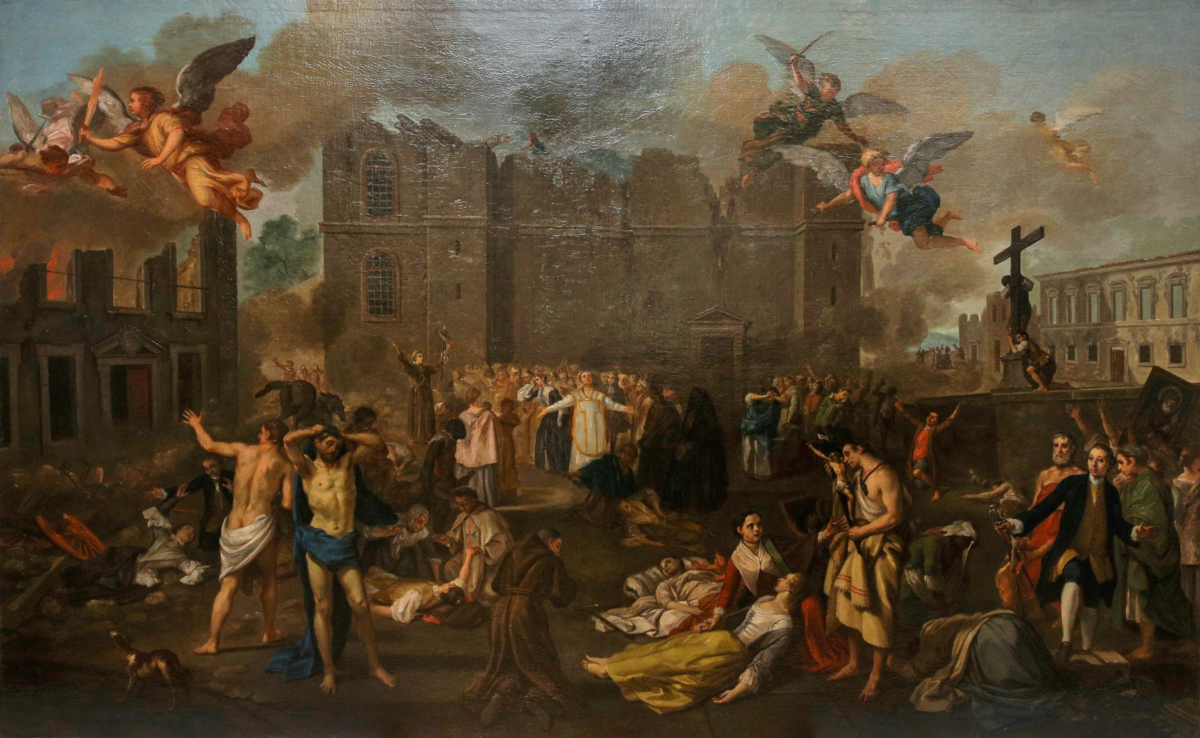Even on that evening His pace was slow and precise. As expected, His black shoes carried none of the muck and mud that was strewed as a squalid carpet across the city streets. His black cloak was, conspicuously, of the finest fabric; His ebony cane was unused, as if for Him it was but a clothing article, and His moustache glistened from oil and smelled of ambergris. Every piece of His apparel betrayed the fact that were He married, His wife would have doubtlessly been treacherous.
His route led him through the Sé Cathedral, upon whose steps sat the beggar. Needless to say, the beggar’s luck did not shine too brightly. Perhaps ‘beggar’ isn’t a suitable description, for to be called a beggar one has to beg for alms, whereas this particular person did not ask for a single thing in his whole life – he simply had nobody to turn to. Nevertheless, certain words do hold certain connotations.
From the moment the beggar saw The Walker his eyes remained fixed, and he watched The Walker’s cold, sure steps with some reproof, but without any real expectation. The Walker, meanwhile, knew of the existence of the look and its owner, but did not make any eye-contact. He wasn’t trying to avoid the beggar, as that would have been absurd, nor did He feel the kind of guilt that calls for the lowering of one’s head. Making eye-contact was simply uncharacteristic of Him, and it certainly didn’t suit His walking routine. And when His slow, inevitable pace carried Him to the steps of the Cathedral – He didn’t pause.
But it’s curious to imagine how that moment would have looked like had He actually paused – had some supernatural power stopped Him and coerced Him to address the eternal question. It would have almost been as if Mont Blanc acknowledged one of its climbers. I can picture Him suddenly halting in front of the steps and addressing, for the first time, the pungent stare. He isn’t annoyed; He simply leans on his cane with a rather blank expression. Perhaps a hint of desperation has sneaked into his voice because of the sheer futility of the subject.
“Well…” He says, turning to the beggar. A stare. Contrary to the usual assumption, He really doesn’t have any experience with conversations. “Don’t you think it’s beautiful, after all?” He asks, broadly pointing at the Cathedral square, the pedestrians, and the humming pigeons. And since He has begun, with His interlocutor remaining but an audience, He continues: “I don’t think it’s so bad, all considered. Indeed, only yesterday did senior Antonio Fernández, the merchant, gaze at the clouds floating over the sea from his window, but a few blocks hence. I can still envision, through his eyes, the romantic and peaceful drawing of that very moment: rooftops and the sea, more or less, painted in the colours of hazel, azure and breeze. It was as beautiful and transcending as the view of Elena Martinez’s body, which was found at the attic of the neighbouring apartment but a few hours earlier. I tell you, sometimes I’m amazed by the beauty of the universe, which manifests itself mostly in the small details. Don’t you think?” He wouldn’t have spoken for so long had He had a choice, and certainly not continually. If only the beggar would play his part!
“You might not see it this way now, but there really is no point for this mute rebuttal. In my opinion, there is no difference between one kind of beauty and another. I accept all beautiful moments with no misgivings, with no show of selection… And even if you were to succeed, how long would it last? Not even for a moment, if we examine it on sufficiently small scales.” He concludes. In my mind, perhaps he remains another moment or two before walking on, out of courtesy, but neither of those present ever looks away.
Surely, anyone who would have found himself in such a situation would have grown annoyed of the man’s silence by now. What’s the logic behind wielding such a meaningful and fateful gaze, if you only keep quiet once the whole cosmos utilizes for the sake of stopping your object? But there is logic, and the walker understands it. Of all the things that one can say of Him, one can’t claim that He doesn’t understand every single occurrence. But He isn’t annoyed; He only turns back to his original route and continues walking. Even the whole cosmos can only do so much.
“The noblest battles are fought in vain.” The beggar would say eventually, almost to himself, and beyond his infinite steps The Walker would understand. He would understand the futility of it all, but also that futility’s singular beauty: the bestial and unstoppable urge, the temporary work of art created by it, and the impending lament of the artist.
Understand, and keep on walking.
